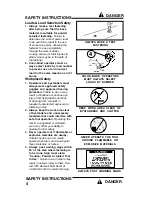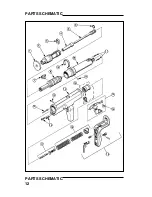
DANGER
DANGER
SAFETY INSTRUCTIONS
5
SAFETY INSTRUCTIONS
Tool Handling Safety
1. Always be sure tool is operating
properly before attempting to
use it. Follow the “Daily
Function Check” shown to the
right and described on page 9.
2. Always load tool using a load
strip selected directly from a box
indicating the power load type
and number. Never attempt to use
loose strip loads that could be
mis-identified.
3. Never carry loose strip loads in
pockets with pins or other hard
objects.
4. Never load a tool unless you
intend to immediately make a
fastening.
Loading a tool and
leaving it unattended in the work
area can result in the tool being
accidentally discharged by others.
5. Never place your hand or any
other body part over the fastener
loading end of the tool.
Serious
hand injury could result from being
struck by either a fastener or the tool
piston should the tool be accidentally
fired.
6. Always store the tool unloaded
and keep the tool and the loads
securely locked in a tool box.
Keep keys away from children
and unlicensed persons.
7. Always keep the tool pointed
away from yourself and others.
8. Never carry a loaded tool around
the work area.
9. Never allow anyone not trained to
use the tool.
10.Never engage in horseplay with
the tool.
11.Using tool in poorly ventilated
areas, cleaning tool or handling
loads may result in exposure to
lead or other substances known
to cause birth defects, and other
physical harm. Have adequate
ventilation at all times and wash
thoroughly after exposure.
ALWAYS DO A DAILY
FUNCTION CHECK BEFORE
LOADING THE TOOL
NEVER LOAD TOOL UNLESS IT
IS TO BE USED IMMEDIATELY
NEVER PLACE HANDS OR
BODY OVER MUZZLE OPENING
KEEP TOOL LOCKED & OUT OF
THE REACH OF CHILDREN


































